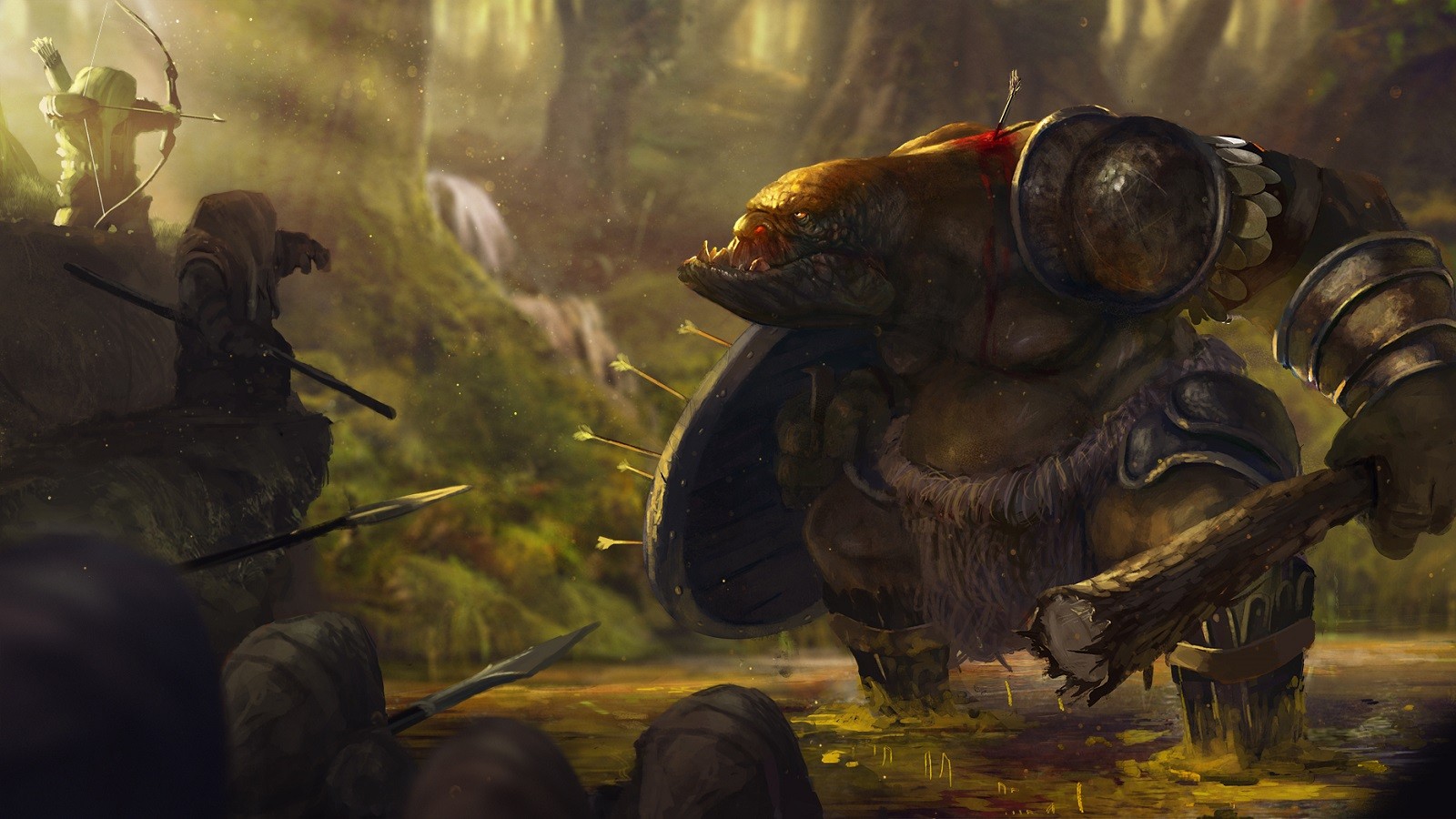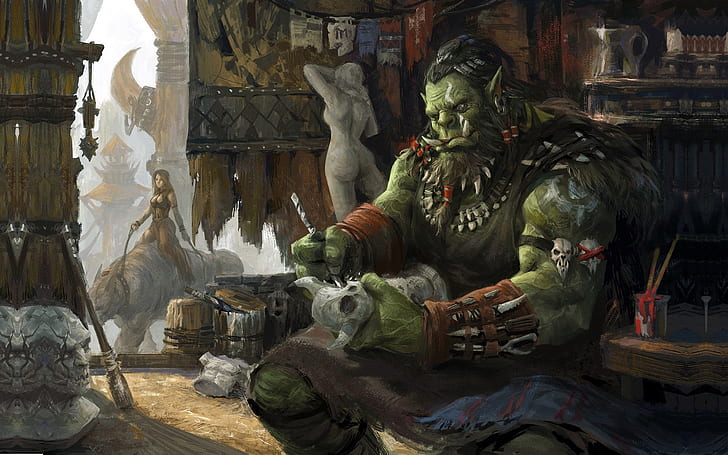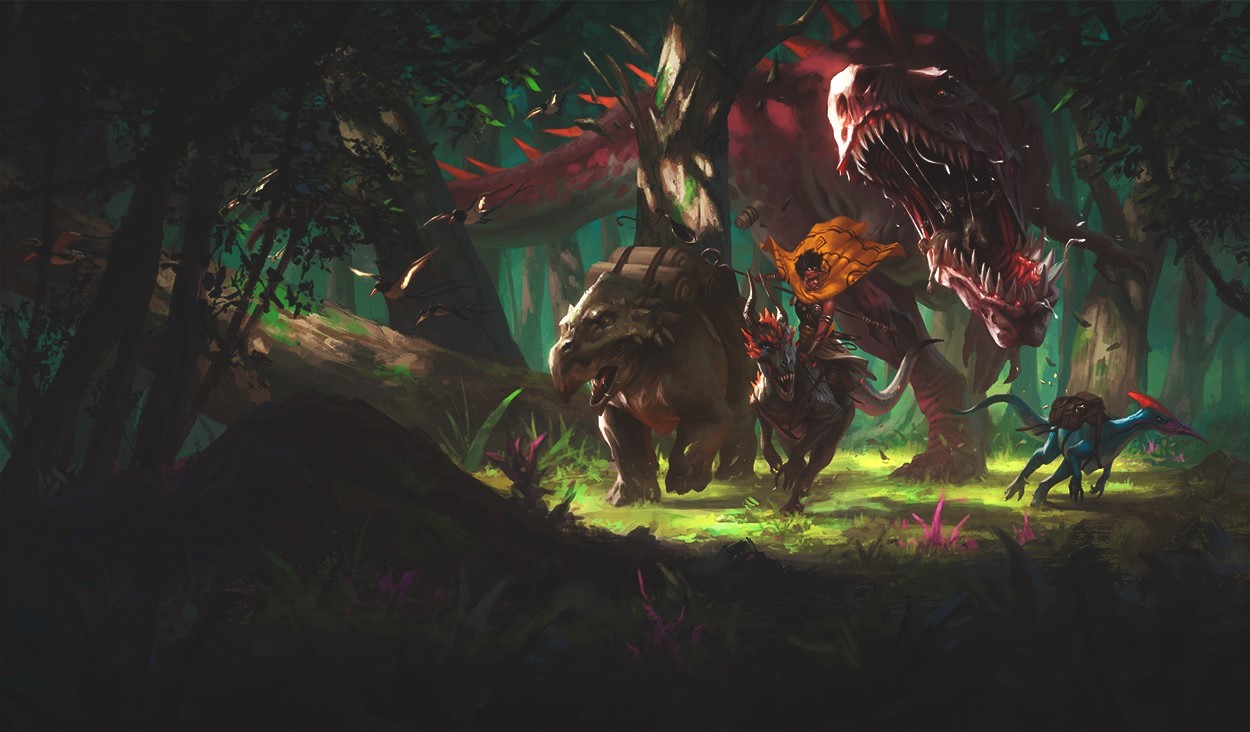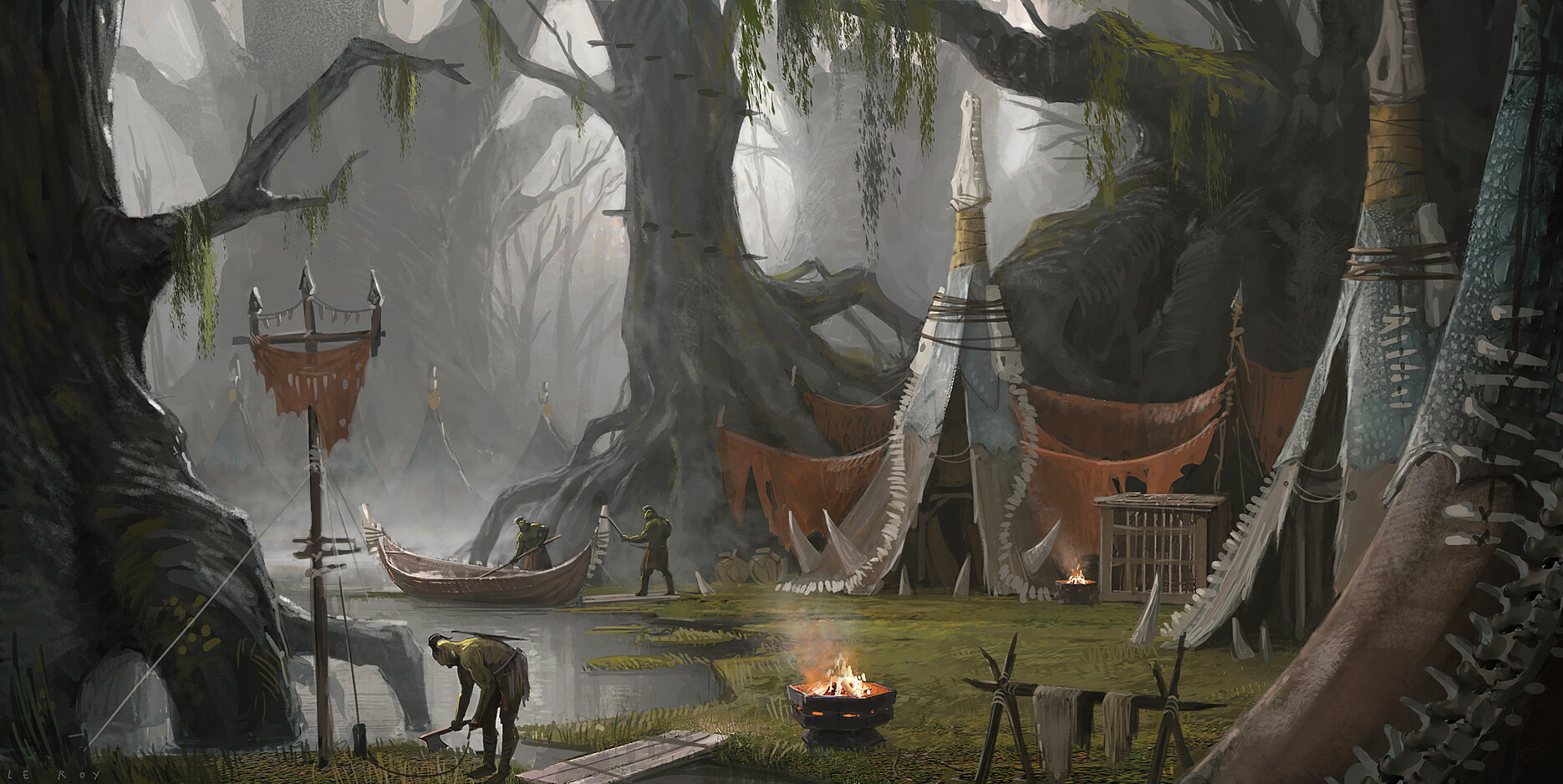Zochakha
Zochakha is a land ruled not by kings, coin, or law, but by strength alone. The nation thrives on a savage hierarchy where might determines status, the strong rise to lead, while the weak are left behind to die. Its people, composed almost entirely of so-called “monstrous” races such as lizardfolk, orcs, trolls, ogres, grungs, and more, reject the notions of nobility and wealth that drive the other nations of Baephios. Instead, Zochakha’s clans and tribes value loyalty to their kin and village above all, believing that one’s life is owed to their bondmates and tribe.
Despite this harsh, unforgiving way of life, Zochakha’s culture is deeply spiritual. The nation is among the most religious on the continent, venerating not only the gods of nature and war but also the forgotten Old gods, whose influence is still felt in the jungles and swamps. Countless temples and ruins dot the land, remnants of the forgotten world, and many Zochakhans believe these sacred places are conduits to divine and ancestral power. While outsiders view the people as savages, Zochakha is a land steeped in tradition and reverence for the divine.
Despite this harsh, unforgiving way of life, Zochakha’s culture is deeply spiritual. The nation is among the most religious on the continent, venerating not only the gods of nature and war but also the forgotten Old Gods, whose influence is still felt in the jungles and swamps. Countless temples and ruins dot the land, remnants of the forgotten world, and many Zochakhans believe these sacred places are conduits to divine and ancestral power. While outsiders view the people as savages, Zochakha is a land steeped in tradition and reverence for the divine.
Structure
Zochakha has no centralized government. Its hierarchy is clan-based, with tribes scattered across the swamps, jungles, and forests. Leadership is earned through strength, cunning, and displays of dominance, with tribal chiefs, champions, and shamans holding sway over their respective clans. The most powerful leader in Zochakha is Queen Bonku "The Wild", a self-proclaimed ruler who commands respect not through bloodline or wealth, but through unmatched ferocity and battlefield dominance. Though her title of “Queen” is mostly symbolic, few dare challenge her claim.
Three major tribes dominate Zochakha’s population, the Maka’nata, Kleu’zi’ra, and Marr’balior, who together comprise nearly 95% of the nation’s people. These tribes were in a long standing brutal civil war sparked by accusations of stolen sacred weapons, a conflict that has left the land drenched in blood. Only the sacred capital of Ponmery remains neutral, serving as a holy site where no blood may be shed under penalty of divine wrath.
Culture
Life in Zochakha is defined by strength, unity, and devotion. Each tribe operates as an extended family, bound by oaths of loyalty and shared blood. Protecting one’s kin is seen as the highest honor, and dying for the bond is considered the ultimate proof of worth. While outsiders often label the people as brutal or barbaric, Zochakha’s culture is built on respect for the natural world, their gods, and their ancestors. Ritual combat, blood oaths, and sacred hunts are common traditions, often used to resolve disputes or honor the divine.
Zochakha is also one of the most religious nations on Baephios, with its people worshipping a wide array of deities. Many worship nature gods such as Mardros, goddess of Nature and Fasteus god of the Hunt and Harvest, while others offer sacrifices to darker powers like Loongam god of Plauges or even the Old Gods, whose worship is outlawed in other nations. The ruins and temples scattered throughout Zochakha serve as sacred pilgrimage sites, believed to house artifacts from a forgotten age, relics so powerful that many risk their lives to find them.
Public Agenda
Zochakha has little interest in the politics of Baephios, focusing instead on the survival and dominance of its tribes. Its leaders prioritize maintaining strength and unity through war, hunting, and trade, while preserving their spiritual traditions. Trade with Arasaka supplies the nation with foreign luxuries and necessities, while exports of rare artifacts, exotic materials, and mercenaries bring wealth to its ports.
Though its people largely avoid foreign entanglements, Zochakha remains wary of the other nations, particularly the Vridium Empire and Vaera Kingdom, both of whom have histories of exploitation and disdain for Zochakha’s culture. While a fragile peace exists, tensions simmer beneath the surface, and the ongoing civil war only deepens the nation’s vulnerability to outside threats. Zochakha sees the Noclon Confederation as harmless and since they are enemies of the empire, Zochakha has come to their aid in previous wars as long as their enemy was the empire.
Assets
- The largest port in Baephios, serving as the hub for trade with Nineveh.
- The continent’s largest warrior population, with unmatched raw combat prowess.
- Vast natural resources from swamps, forests, and rivers.
- Countless ancient ruins and temples filled with artifacts of the forgotten world.
- A strong spiritual connection, granting Zochakha powerful shamans and divine casters.
History
In ancient times, Zochakha was known as a vibrant, peaceful land, rich in culture and tradition, and a popular destination for travelers and merchants. This harmony ended when the Vridium Empire attempted to impose control over the region, appointing a foreign king to govern its people. Outraged, the tribes united in revolt, slaughtered the “imposter king,” and waged war against the Empire. Though the conflict ended in a truce, a powerful sage raised the Karst Pillars to isolate Zochakha from the rest of Baephios, ensuring peace through separation.
Isolation, however, bred change. Over centuries, Zochakha became more violent, and more focused on strength as survival. Immigration from Arasaka introduced new races and customs, blending with the native tribes to form the fiercely independent, warlike culture seen today. Now, a millennium later, Zochakha is viewed by outsiders as the “savage lands,” a place of chaos, blood, and mystery, yet still a land where faith, tradition, and strength endure.
Demography and Population
Zochakha’s population consists almost entirely of “monstrous” races: lizardfolk, orcs, trolls, ogres, hobgoblins, bugbears, grungs, and more. Smaller populations of tortles, goblins, and kenku also thrive within its borders. Humans, elves, dwarves, and gnomes are rarely seen, and those who enter often face hostility unless they prove their worth in combat or trade.
The people live primarily in tribal villages, with very few cities outside of Ponmery, the sacred capital. Most settlements are self-sufficient, relying on hunting, fishing, and raiding to survive.
Territories
Zochakha is a sprawling land of swamps, jungles, and forests, dotted with towering Karst formations that mark its borders. The Mirrored Rise mountains form part of its northern edge, while its southern coasts host the continent’s largest port. Ancient ruins, vine-choked temples, and forgotten relics are scattered throughout the wilderness, often guarded by monsters or curses.
Military
Though Zochakha has no formal army, its sheer number of battle-hardened warriors makes it the most dangerous military force on Baephios in raw strength. Each tribe fields thousands of fighters, orcs with brutal axes, lizardfolk ambushers, grung poisoners, and more, whose tactics are savage but devastating. While they lack the discipline and equipment of the Vridium legions, no knight would willingly face a Maka’nata warrior one-on-one.
Technological Level
Zochakha is primitive compared to Hugo City or the Vaera Kingdom, relying on natural materials, simple tools, and spiritual magic. However, its shamans wield potent divine and primal magic, and its artifact hunters occasionally unearth relics of immense power from the forgotten world.
Foreign Relations
Zochakha avoids direct political involvement with the other Baephios nations, though it maintains active trade with Aramelgo and tolerates limited commerce with the Vaera Kingdom and Noclon Confederation. Relations with the Vridium Empire remain cold, with lingering resentment from their historical attempts at conquest.
Laws
- Hierarchy is determined solely by strength; challenges of combat can change leadership at any time.
- Betraying one’s tribe or bond is punishable by death.
- Ponmery, the sacred capital, is a neutral ground; violence within its borders invokes divine punishment.
- Worship of any god, including Old Gods, is permitted, though sacrilege against a god is a death sentence.
- Foreigners must prove their worth through combat, trade, or service to gain the protection of a tribe.
Agriculture & Industry
Zochakha relies on hunting, fishing, and foraging, supplemented by trade with Aramelgo for grains, metals, and tools. Many tribes craft weapons, poisons, and charms, often infused with spiritual or magical properties. Its greatest “industry,” however, is the plundering and trading of artifacts from its countless ruins.
Trade & Transport
Most trade is conducted through Zochakha’s great southern port, with goods traveling along rivers and jungle trails to reach inland tribes. Rafts, canoes, and beast-drawn sledges are common, as the dense terrain prevents large-scale road systems.
Education
Knowledge in Zochakha is passed down orally through shamans, elders, and warriors. Spiritual teachings, combat training, and survival skills form the core of education, while literacy is rare outside of shamans and leaders. Sacred ruins also serve as places of learning, where those deemed worthy may uncover ancient secrets.
Infrastructure
Unlike the grand cities and sprawling roads of the other nations, Zochakha’s infrastructure is entirely practical and adapted to its rugged environment. Most settlements are tribal villages built from wood, stone, and natural materials, often raised on stilts above swampy ground or nestled within the safety of dense jungle. Roads are rare, replaced by dirt trails, rivers, and rope bridges connecting territories.
The greatest manmade structures in Zochakha are its sacred ruins and the colossal Karst Pillars, which serve both as a defensive barrier and a symbol of the nation’s independence. Ponmery, the sacred capital, is the only true “city,” a sprawling settlement built around a massive, ancient temple complex where the gods are said to watch directly over their people. Zochakha’s southern port city, simply called The Great Dock, is a chaotic but vital hub, where foreign trade is conducted and mercenary contracts are brokered.
Mythology & Lore
The Monarchs of Baephios are an avid myth in all the nations of Baephios. Additionally, Zochakha is the only nation in the world who embraces the Old gods.
“Strength Above All, Blood for the Bond.”
Founding Date
Roughly 1,000 years ago, following the Karst Division.
Capital
Alternative Names
The Savage South, The Tribelands, Land of the Karsts
Demonym
Zochakhan
Leader
Government System
Tribalism
Power Structure
Thalassocracy
Economic System
Barter system
Major Exports
Ancient artifacts, exotic materials (poisons, rare herbs, monster parts), mercenary warriors, and spiritual charms.
Major Imports
Grains, metals, crafted tools, luxury goods, and foreign weaponry.








Comments